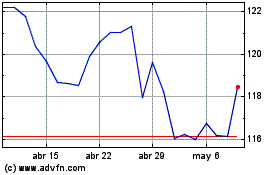Exxon Pledges to Cut Methane Emissions 15% by 2020
23 Mayo 2018 - 1:02PM
Noticias Dow Jones
By Rebecca Elliott and Sarah Kent
Exxon Mobil Corp. plans to reduce methane emissions 15% by 2020,
the latest in a series of pledges by major oil companies to
voluntarily curtail releases of the potent greenhouse gas.
The Texas-based company also said it intends to cut flaring, or
burning of natural gas, by 25% over the same period. Those efforts
likely will be concentrated in West Africa. Both reduction targets
are compared with 2016 levels.
Exxon's move Wednesday, a week before its annual meeting May 30,
comes as pressure from investors mounts on big oil companies to not
only disclose climate-related business risks, but also take action
to reduce emissions linked to global warming.
Companies have also come under fire from activists for flaring
natural gas, which can increase air pollution, during oil and gas
production.
"We have a longstanding commitment to improve efficiency and
mitigate greenhouse gas emissions," said Exxon Chief Executive
Darren Woods in a statement. "Today's announcement builds on that
commitment and will help further drive improvements in our
business."
BP PLC said in April that it will keep its emissions flat out to
2025 even as it grows. The company set a target to cut 3.5 million
tons of greenhouse-gas emissions from its operations over the
period, focusing on reducing methane emissions as a key part of
this. Royal Dutch Shell PLC last year announced a plan to halve the
company's carbon footprint -- including emissions caused by drivers
who burn Shell fuel -- by 2050.
Much of the pressure to address climate change has come from
shareholders. Last year, a group of investors with roughly $30
trillion under management launched a five-year effort to push the
world's biggest corporate polluters to reduce emissions and improve
transparency and governance around climate.
At Shell's annual meeting Tuesday, investors with nearly $8
trillion under management called on the company to go beyond its
already ambitious plans to curb emissions and set firm targets.
Exxon and Chevron Corp. are also expected to face questions on the
subject at their annual meetings next week.
"Investors are not going to let go," said Mindy Lubber, CEO and
president of Ceres, a Boston-based nonprofit group that works with
investors to promote sustainable business practices. "The level of
effort going in is exponentially more substantial than last year or
the year before."
Companies have invested heavily in natural gas in recent years,
touting the fuel as a greener alternative to coal, which emits far
more carbon dioxide when converted to electricity. However, that
does not account for methane, which is the primary component of
natural gas and often leaks into the atmosphere as the resource is
extracted and transported.
The Environmental Defense Fund, a nonprofit environmental
advocacy group that has been working to highlight methane and
flaring issues, said it supported Exxon's plan to cut emissions,
but called for "greater ambition."
"In a carbon-constrained world, oil and gas industry leaders
should seek to virtually eliminate emissions of this highly-potent
greenhouse gas," said Matt Watson, EDF's associate vice president
for climate and energy, in a statement.
Write to Rebecca Elliott at rebecca.elliott@wsj.com and Sarah
Kent at sarah.kent@wsj.com
(END) Dow Jones Newswires
May 23, 2018 13:47 ET (17:47 GMT)
Copyright (c) 2018 Dow Jones & Company, Inc.
Exxon Mobil (NYSE:XOM)
Gráfica de Acción Histórica
De Mar 2024 a Abr 2024

Exxon Mobil (NYSE:XOM)
Gráfica de Acción Histórica
De Abr 2023 a Abr 2024
